- The Moneycessity Newsletter
- Posts
- 99% of Investors Don't Understand the Stock Market
99% of Investors Don't Understand the Stock Market
Many people believe the stock market is a Ponzi Scheme. But, does the claim hold up to scrutiny?
Many people out there think that the stock market is a Ponzi scheme.
There are some compelling reasons to think this is true, but I’ve always just assumed that they wouldn’t stand up to scrutiny at all if I were to dig into these arguments.
So I decided to finally give the devil its due and drill down onto some of the top arguments for why the stock market is a Ponzi scheme, and I think I found some interesting stuff.
On the go? Watch the video HERE.
What is a Ponzi Scheme?
Michael Scott was tricked into entering a Ponzi scheme, and Phil, the owner of this company, clearly doesn’t make a profit because Michael and the other investors are not being paid by company profits. They are dependent on bringing in new investors for them to make any money at all.
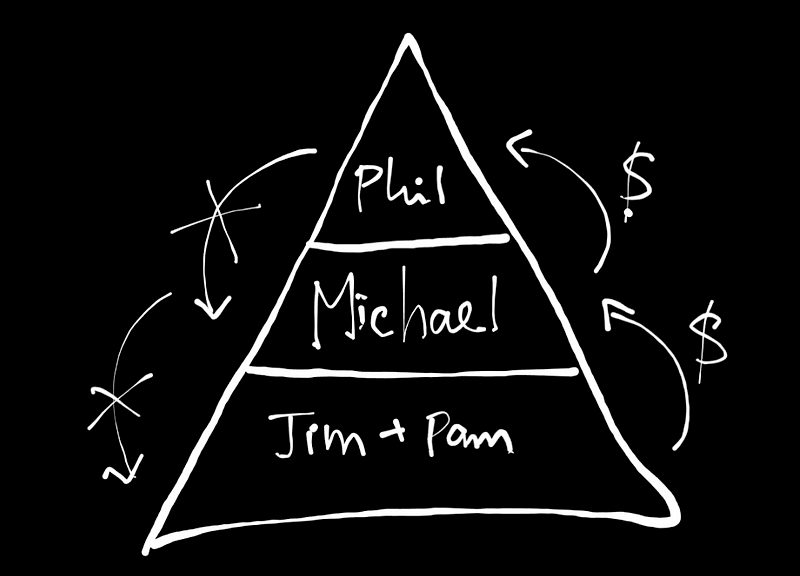
The Office’s Ponzi Scheme — Illustration by Author
According to the government, a Ponzi scheme is an investment fraud that pays existing investors with funds collected from new investors with little or no legitimate earnings.
A Ponzi scheme will fall apart whenever the existing owners fail to bring in enough new investors to pay for the returns of their existing investors.
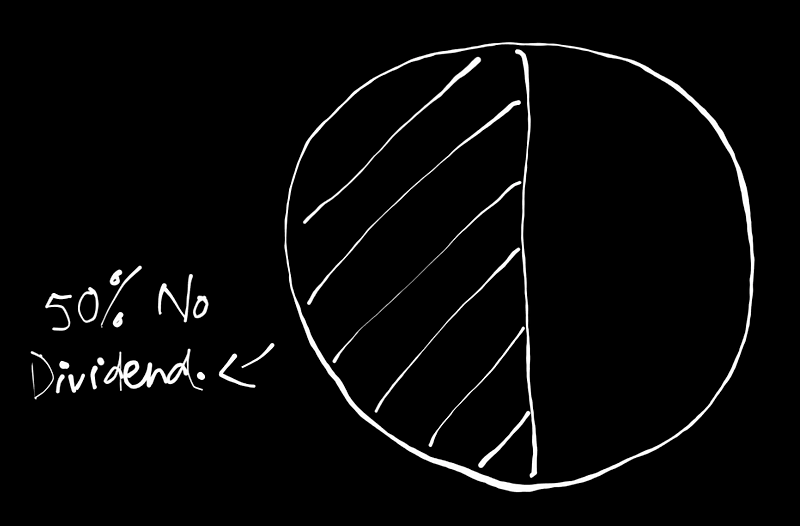
Illustration by author
Roughly half of these companies do not pay a dividend.
If we’re looking at just the non-dividend half of the stock market, maybe this does seem a little bit like a Ponzi scheme because whenever you buy into a company that does not pay a dividend, the only way you’re making money is if you’re able to sell to a new investor.
Basically, your profits are dependent on new investors coming in with more money than what you did.
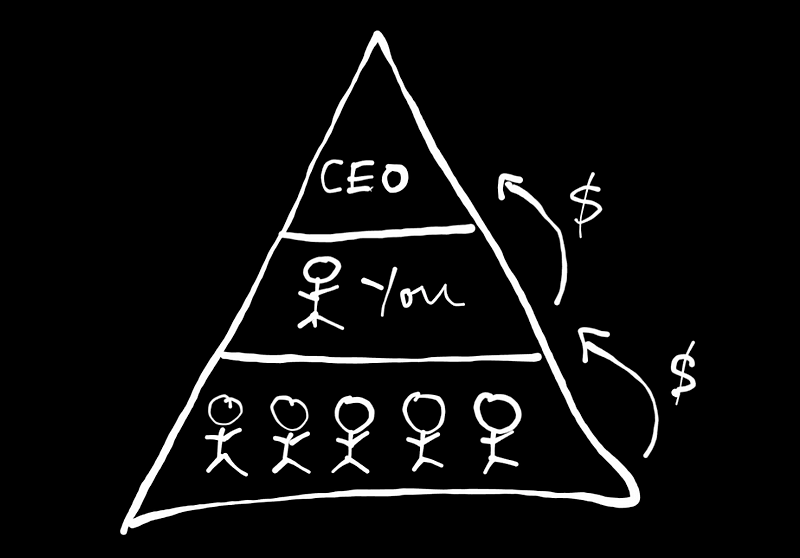
Ponzi Scheme — Illustration by author
In reality, dividend-paying companies pay shareholders with the company’s profits, while Ponzi schemes only pay existing investors with money received from new investors.
So what are investors actually getting when they’re buying shares of stock?
Comparing Ponzi Schemes to the Stock Market
It turns out there is one key difference between owning shares of a publicly traded company and being in a Ponzi scheme.
With the Ponzi scheme, as an investor on the bottom rung of the pyramid, you only have power in one direction by bringing in new investors.
On the other hand, if you own shares in a publicly traded company, you can not only sell your shares for more than what you bought them for which is the downward control, but also have voting rights, which go up the chain.
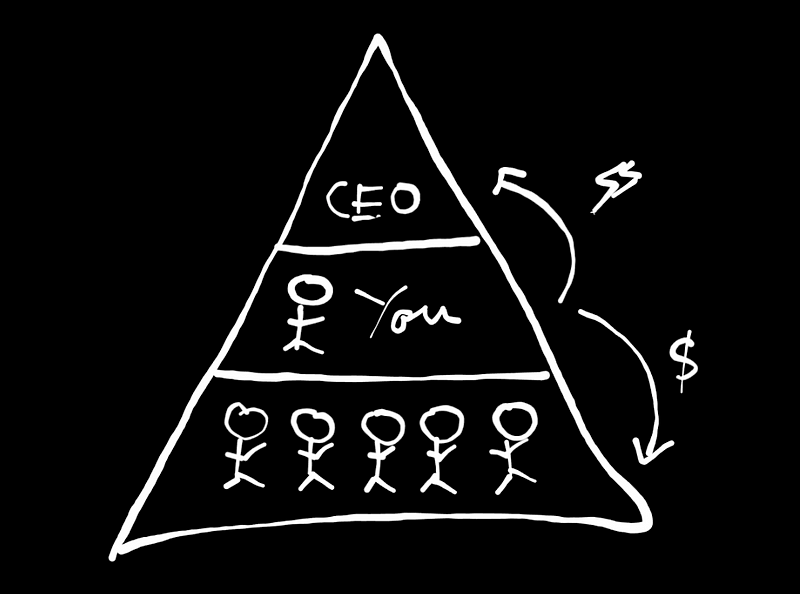
Publically traded company — Illustration by author
You can vote on:
Board of directors who can hire and fire key positions like the CEO
Implementing, raising, or lowering a dividend
Mergers and acquisitions
There is a lot of power that you have as the shareholder in a publicly traded company over the fate of that company.
So you’re not just in this side game of trading shares for more or less money. You also have access to a real and profitable business. Even though you’re not getting access to those profits in the form of a dividend, you do have control over a profitable business.
But, not all companies issue fair and equal voting rights with their stocks.
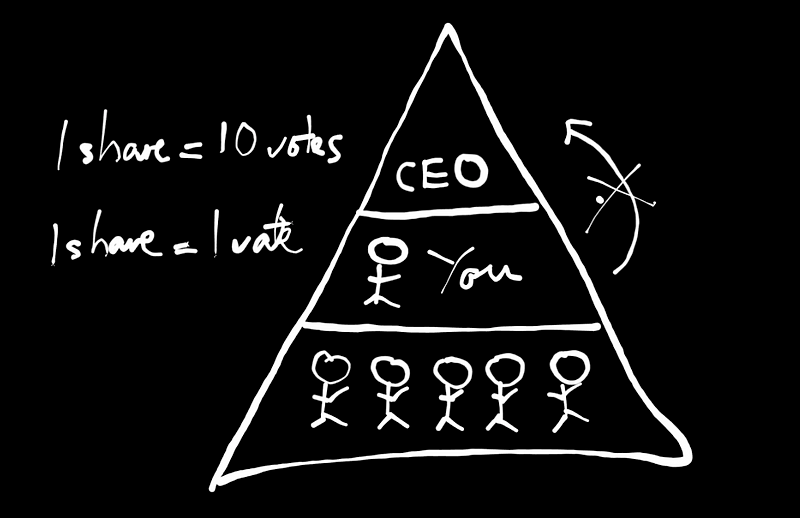
Publically traded company with unequal voting shares— Illustration by author
If the guy at the top is getting 10 votes per share and you at the bottom are only getting 1 vote per share which effectively eliminates all the control that you thought you were getting by owning a share of stock.
If we go back to the pie chart, half of those companies didn’t pay dividends but 7% of those non-paying companies issued unequal voting shares.
What am I actually getting when I own one of those shares because it seems like I’m not getting a cut of the company’s profits in the form of a dividend, and I’m not getting any control over this profitable company?
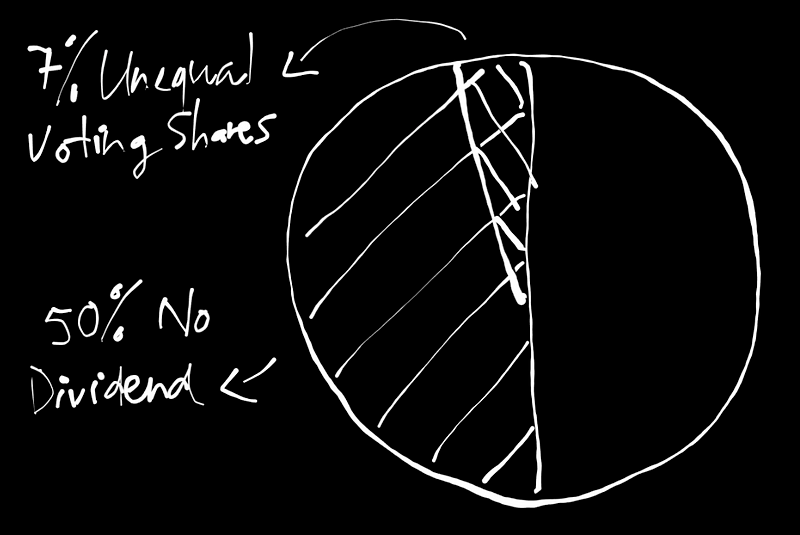
Illustration by author
When I own a house, I’m reliant on being able to sell that house to a new investor for more money if I want to profit. But if I’m not able to sell the house, at least I still have a house. I have something there.
When I own the stock, is it just an arbitrary, meaningless piece of paper? It’s not even a piece of paper anymore. Is it just ones and zeros in the cloud?
To answer that question, I think I have to get back into the nuts and bolts of what happens when a company goes public and starts issuing shares.
How Do Business Owners Make Money
When someone starts a business, they do so to make money. And there are four ways that a business owner will typically make money.
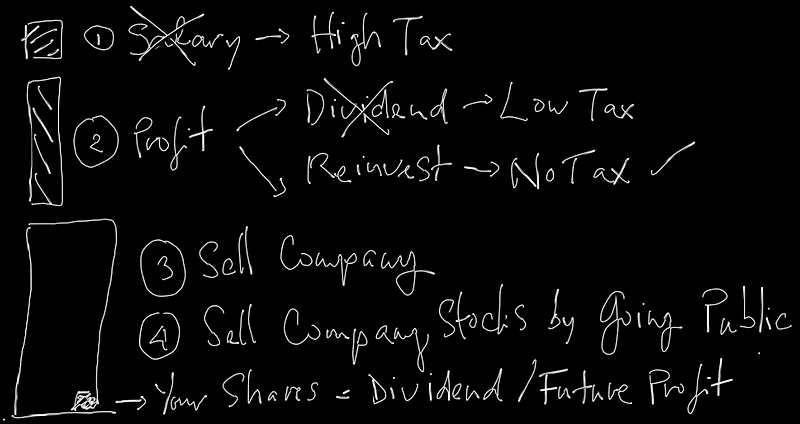
How businesses make money — Illustration by author
The first and most common is through a salary. However, business owners typically want to minimize the salary compared to the other sources of making money because taxes are much worse for the salary.
The second way is through the company’s profits. The owner can access that stack of cash every year by getting paid a dividend which has a much better tax rate. But in this case, I’m going to assume that this company is not paying a dividend. They are reinvesting that profit every year back into the company to grow the value of the company.
The other ways the owners of a company get paid are through the value of that company. The only way for the owner to access the stack of cash is by either selling the whole company OR
Selling little pieces of the company by going public. When this happens, the company’s value is divided up into millions of shares. The owner keeps his portion of the shares and then sells the rest to the public.
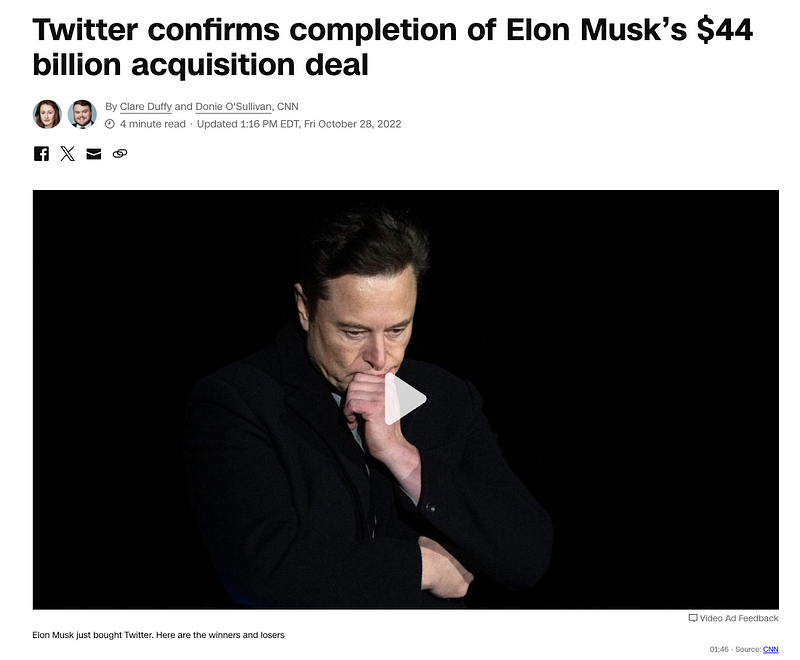
Twitter confirms completion of Elon Musk’s $44 billion acquisition deal
Now, even if the public has no voting power, they are still entitled to their portion of any future dividends that the owner decides to pay. Even if the owner’s not paying any dividends right now and they’re putting all of that value back into the company, the shareholders are entitled to their portion of the company’s value if the company were to sell out one day.
This was illustrated perfectly when Elon purchased Twitter for $44 billion. At the time of the sale, the owners of the company only owned 2.5% of Twitter. The general public owned 17.7% and institutions actually owned 80% of Twitter. So the owners had already sold out along the way. And when Elon Musk came along and paid $44 billion for Twitter, way more of that cash actually went to the shareholders than went to the owners.
So in the event of a sellout, it doesn’t really matter if you don’t have voting rights. But what if a company never issues a dividend and never sells?
Some Companies Will Never Sell?
So let’s revisit our pie chart where we eliminated half of the companies that pay a dividend to the remaining companies and 7% of those do not give a fair and equal voting share to stockholders. And then of that 7% of that tiny percentage, maybe there are some companies that never pay a dividend, never sell out, and just dwindle and die eventually.
I think those companies would be better described as just “bad investments”, and it’s much easier to deal with bad investments than it is to visualize the entire stock market as a giant Ponzi scheme.
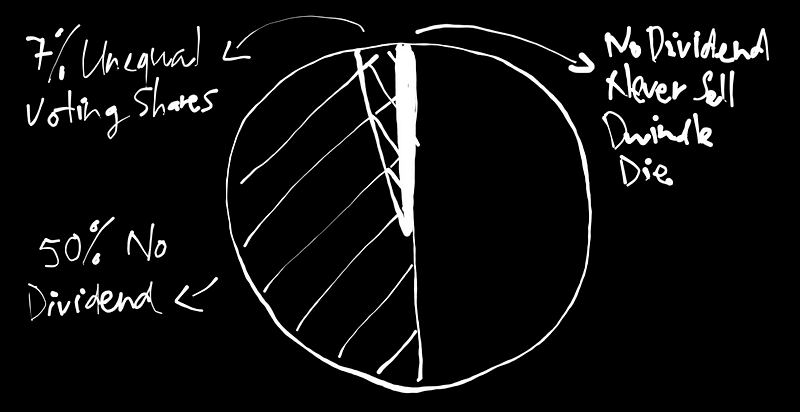
Illustration by author
Fortunately for us, with publicly traded companies, all of the financial information is out there. We can look and see what are their profits and what is their free cash flow.
And I do this HERE where I analyze publicly traded companies to see if they’re a good investment. Check it out.
Catch you on the flip side.

Reply